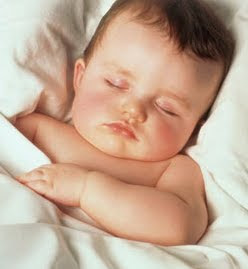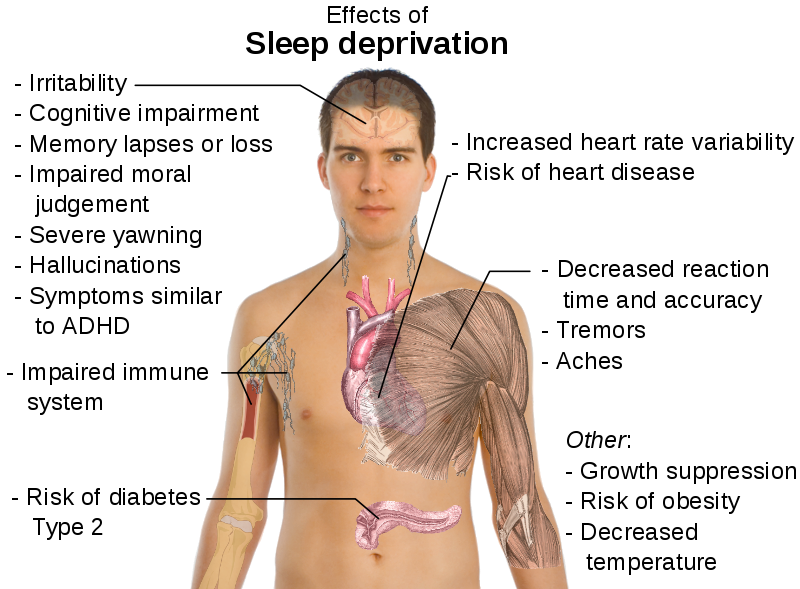
How do you sleep? Do you put your head on the pillow, and go out like a light, only waking 8 hours later feeling refreshed and energised? Or do you climb in to bed, dreading the night ahead, knowing it’s probably going to take hours of tossing and turning to get to sleep, or you will wake sometime in the early hours and not be able to drop back to sleep?
There are a lot of reasons for sleep disturbance, including stress, noise, medical conditions; such as sleep apnoea (a condition that effects breathing), chemical inbalances within the body, such as hormonal fluctuations that occur with menopause or the menstral cycle, caffeine intake during the day and certain medications. Depression and anxiety are also major contributors to poor sleep habits, indeed an inability to stay asleep may be the only sign of depression.
Poor sleep quality doesn’t just leave you feeling a bit tired, as this diagram shows.
There are a lot of reasons for sleep disturbance, including stress, noise, medical conditions; such as sleep apnoea (a condition that effects breathing), chemical inbalances within the body, such as hormonal fluctuations that occur with menopause or the menstral cycle, caffeine intake during the day and certain medications. Depression and anxiety are also major contributors to poor sleep habits, indeed an inability to stay asleep may be the only sign of depression.
Poor sleep quality doesn’t just leave you feeling a bit tired, as this diagram shows.
Tips for a better nights sleep
Firstly, you may need to consider some lifestyle changes.
Next, check out your sleep environment
Getting ready to go to bed
- Try to keep a regular routine for going to bed and getting up in the morning.
- Avoid caffeine 4-6 hours before bed time. This may be in the form of coffee, soft drinks like coke, black tea, energy drinks, some fat burning supplements and even chocolate!
- Get regular exercise, especially in the afternoon. But try to avoid strenuous exercise 2 hours before bed time, as this can actually wake you up.
- Use caution around napping. Power naps – 10-20min naps – are said to improve alertness, but extending past this means it is more likely that you will drop in REM sleep, a deeper state of sleep, that can be harder to wake up from, leaving you feeling groggy, until you try to go to bed, at which time you feel more alert, and can’t get off to sleep!
- Some foods, such as spicy, sugary or heavy meals, can also make sleeping restfully difficult.
- Drinking alcohol may help you to fall off to sleep, but the quality of the sleep is poor, and as the alcohol levels in the blood wear off, the effect can actually wake you up.
Next, check out your sleep environment
- A comfortable bed and bedding is a must; getting tangled in sheets, or being too hot or cold won’t help you to sleep well.
- A cool, rather than cold, bedroom offers the best conditions for sleep.
- Try to eliminate all light, and distracting noises
- Don’t use your bed as an office, workroom or TV room; save your bed for sleep and intimacy only – your mind and body will come to recognise bed as somewhere to relax and sleep, rather than staying awake and working.
Getting ready to go to bed
- Follow a pre-sleep ritual, such as reading or sitting quietly, even a warm bath.
- Practice relaxation techniques before bed; for example yoga, breathing techniques or progressive muscle relaxation. Napier City Massage has CD’s available with relaxation and breathing exercises. Just ask me !
- Don’t let your worries into the bedroom; it may be practical to reserve a “worry time” earlier in the evening, where you try to process these before attempting to sleep. See the separate box below for instructions on a really simple and effective distraction technique.
- Get comfortable.
- Don’t force it! If you can’t fall asleep within 20-30 mins, get up and go into another room, do a non-stimulating activity, such as reading, for about 20 mins, or until you feel sleepy.
- You may like to have a LIGHT snack before bed; warm milk and bananas both contain amino acids that help the body to sleep. But avoid sugary or salty snacks!
It may be necessary to look at your diet; are you deficient in some minerals or vitamins that are upsetting your balance? For instance, most NZ'ers are deficient in magnesium, a mineral critical in a number of the body's major functions, including relaxation of the muscles.
Talk to your doctor or health provider if you think this may be an issue for you. A nutritionist, such as Alison Cowell of Healthy Eating is another good source of information.
A doctor may offer you conventional medicine to be used in the short term, such as sleeping pills, sedatives or antidepressants.
Talk to your doctor or health provider if you think this may be an issue for you. A nutritionist, such as Alison Cowell of Healthy Eating is another good source of information.
A doctor may offer you conventional medicine to be used in the short term, such as sleeping pills, sedatives or antidepressants.
| DISTRACTION TECHNIQUE This is my favourite method for getting to sleep when my mind is racing and I can't relax, or I wake up in the middle of the night and lie there tossing and turning... Firstly, lie comfortably. Although it's not my preferred sleeping position, I find lying flat on my back, with my arms either at my side, or resting on my tummy, is the best for this exercise. Now, take a gentle breath in through the nose, and feel the air filling up your belly. As you breath out slowly, let your belly sink away. Now choose a category, such as countries, or cities, plants, animals, fruit and veg are all favourites of mine. On your next in breath, say the letter A to yourself, and on the out breath say a word for your category that starts with A. And continue this through the alphabet. Yes, you are concentrating, but you are physically making your body relax as you breath in and out, and you are distracting your mind from thinking about the things that are racing around in your head. If you get stuck on a letter, don't stress about it, just move on the the next letter. You may only get halfway through before you're ready to nod off or it may take more than 1 run through the alphabet, and more than 1 category, especially if you're quite agitated, but give it the time, and it is really effective. Finally, I have CD's with relaxation exercises that you can listen to as you actively relax before bedtime, or if you are stressed during the day. The CD's cost $10. Ask me for a copy. | Other alternative therapies, such as acupuncture, naturopathy, massage and homeopathy may all be able to help; and I'm reluctant to recommend one over the other - we are all different, and it can be a matter of finding the right method that suits you. Homeopathy is one such alternative therapy. This information was given to me by Heidi Back of Thrive Homeopathy. "Homeopathy is a safe, effective and non- toxic form of natural medicine which has been successfully used worldwide for 200 years. It can treat acute and chronic conditions by looking at the cause of your illness and your reaction to it. If you no longer want to only manage, suppress or ignore what is holding you back from living your life fully, then consider homeopathy. The selected remedy is individual to each person. There is no one size fits all but everyone; baby, child, teen or adult will benefit. Do you suffer from anxiety, depression, migraines, sleep disorders ? These are just some complaints homeopathy can help with." Consult me, Heidi Beck your local Homeopath & Bach Flower Practitioner, 1 Lambton Rd, Hospital Hill, Napier. I offer free initial 15 minute consults if you are in doubt of how and if homeopathy can help you. Call 021 33 52 33 or email [email protected] before Christmas to get your initial consult at the reduced cost of $50. You have nothing to lose and everything to gain. |


 RSS Feed
RSS Feed
